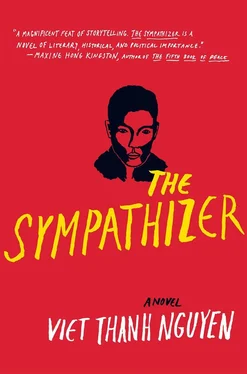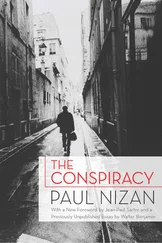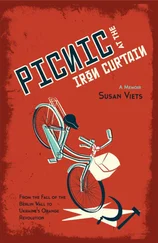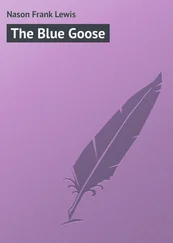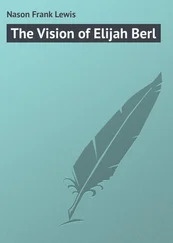We spent two weeks acclimating to the weather and our new comrades, among whom were three characters I had never expected to see again. These marine lieutenants were bearded and longer-haired than on the night Bon, Man, and I had encountered them in that Saigon alley, singing, Beautiful Saigon! Oh, Saigon! Oh, Saigon! , but they were still recognizably dumb. They had made their way to the docks on the day Saigon fell, and there had jumped on board the admiral’s ship. We’ve been in Thailand ever since, said the marine who was the leader of the three. He had been steeped in the Mekong Delta his entire life, as his comrades had been, all of them branded by a life in the sun, although in different shades. He was dark, but one of the other marines was darker, and the third was the darkest of all, black as a cup of black tea. They, Bon, and I grudgingly shook hands. We’re going with you across the border, said the dark marine. So we better get on each other’s right sides. This was the marine on whom I had drawn my pistol, but since he chose not to mention this fact, neither did I.
Altogether there were a dozen of us on the reconnaissance team that set out early one night, led by a Lao farmer and a Hmong scout. The Lao farmer had no choice in the matter. He had been kidnapped by the admiral’s men on an earlier reconnaissance, and was now being used as a guide, given his knowledge of the terrain through which we were traveling. He could not speak Vietnamese but the Hmong scout could and served as his translator. Even from a distance, one could see that the scout’s eyes were a ruin, dark and shattered as the windows of an abandoned palace. He was clad in black, as we all were, but he was unique in wearing a faded green beret a size too large, the brim resting on his ears and eyebrows. Following him were two of the marines, the dark one armed with an AK-47 and the darker one with our M79 elephant gun, its stubby grenades resembling short, metallic dildos. After the marines came the affectless lieutenant and the grizzled captain, who could not bring themselves to carry the enemy’s AK-47 and instead toted the M16. Behind them was the skinny RTO, grease gun in hand and PRC-25 radio on his back. Next was the philosophical medic, M3 medical kit hanging from one shoulder and M14 from the other, as no man on this reconnaissance could go unarmed. He and I had hit it off right away during an evening perfumed with jasmine and marijuana. Besides sadness and sorrow, he had asked me, what’s really heavy but weighs nothing at all? When he saw that I was stumped, he said, Nihilism, which was, in fact, his philosophy. Then came the hefty machine gunner, M60 in his arms, with myself and Bon next, me with an Ak-47, Bon with the M16. Bringing up the rear was the darkest marine, his weapon the B-40 rocket launcher.
For defense, in place of bulletproof vests and helmets, each of us was given a laminated, wallet-sized picture of the Virgin Mary to wear over our hearts. The admiral had blessed us with these gifts on our departure from the camp, which was, for most of us, a relief. We had spent our days discussing tactics, preparing rations, and studying the map of our route through the southern end of Laos. This was terrain probed by the marines on earlier reconnaissance, home to the Lao farmer. Smugglers, he claimed, crossed the border all the time. Periodically we listened to Radio Free Vietnam, its crew working from a bamboo shack next to the admiral’s hut. From there they broadcast the admiral’s speeches, read items translated from newspapers, and aired pop songs with reactionary sentiments, James Taylor and Donna Summer being particular favorites of the season. The communists hate love songs, said the admiral. They don’t believe in love or romance or entertainment. They believe the people should only love the revolution and the country. But the people love love songs, and we serve the people. The airwaves bore those love songs, laden with emotion, across Laos and into our homeland. In my pocket was a transistor radio with an earpiece so I could listen to the broadcast, and I valued it more than my weapon and the Virgin Mary. Claude, who did not believe in her or any god, gave us his secular blessing in the form of high fives as we left. Good luck, he said. Just in and out. Quick and quiet. Easier said than done, I thought. I kept that idea to myself, but I suspected that many of the dozen of us might have been thinking the same thing. Claude intuited my worry when he squeezed my shoulder. Take care of yourself, buddy. If anybody starts shooting, just keep your head down. Let the pros do the fighting. His estimation of my abilities was moving and most likely accurate. He wanted to keep me safe, this man who, along with Man, had taught me everything I knew about the practices of intelligence, of secrecy as a way of life. We’ll be waiting for you guys to come back, said Claude. See you soon, I said. That was all.
We set off on our march under a sliver of moon, cheered by the optimism that one sometimes had at the beginning of strenuous exercise, a kind of helium that filled our lungs and carried us along. Then, after an hour, we trudged, or at least I trudged, my helium depleted and replaced with the first hints of fatigue, soaking into the body as the slow drip of water soaks into a towel. A few hours into our march we arrived at a pool of water, where the grizzled captain called for a rest. Sitting on the edge of the moonlit pool and resting my sore thighs, I could just make out the phosphorescent, disembodied hands on my wristwatch pointing to one in the morning. My hands felt as detached as the watch’s hands, for what they wanted was to hold and caress one of the cigarettes in my breast pocket, the urge electrifying my nervous system. Seemingly unaffected by any similar yearning, Bon sat down next to me and silently ate a rice ball. A fetid smell of mud and decaying vegetation emanated from the pool, and on its surface bobbed a dead bird the size of a finch, floating in a corona of molting feathers. Bomb crater, Bon muttered. The bomb crater was an American footprint, a sign that we had entered Laos. We came upon more of these craters as we journeyed east, sometimes singly, sometimes in clusters, and we had to pick our way carefully past the julienned remnants of unrooted cajeputs flung this way and that. Once we came close to a village, and on the banks of the craters nearby we saw nets on poles, ready to be dipped into these pools that the farmers had stocked with fish.
Near dawn the grizzled captain halted our trek, at a spot the Lao farmer said was isolated and rarely visited by the inhabitants of this borderland. Our resting place was on the peak of a hill, and under the indifferent cajeputs we spread our ponchos and covered ourselves with hooded capes of netting into which we had woven palm fronds. I lay down with my head on my rucksack, which, besides my rations, contained Asian Communism and the Oriental Mode of Destruction , tucked away in my rucksack’s false bottom in case I ever needed it again. Two or three of us stayed awake for shifts of three hours, and it was my misfortune to be assigned to one of the middle shifts. It seemed that I had barely managed to fall asleep with the brim of my hat on my face when the hefty machine gunner shook my shoulder and exhaled his horrendous bacterial breath all over my face, informing me that it was my turn for sentry duty. The sun was high in the sky and my throat was parched. I could see the Mekong in the far distance through my binoculars, a brown belt dividing the earth’s green torso. I could see question marks and exclamation points of woodsmoke issuing from farmhouses and brick factories. I could see bare-shinned farmers wading after their water buffalos, fetlock deep in the muddy water of rice paddies. I could see countryside roads and paths trafficked by vehicles that, from a distance, moved with the tortured slowness of arthritic turtles. I could see the crumbling sandstone ruins of an ancient temple, erected long ago by some fallen race, overseen by the crowned head of some forgotten tyrant, blank eyes blinded by the waste of his empire. I could see the entire lay of the land, naked body exposed in sunlight and resembling not at all the mysterious creature of night, and suddenly a tremendous longing seized me with such force that the land itself lost focus and trembled, and I realized with equal parts amazement and dread that for all the essentials we had brought with us, none of us had brought a drop of liquor.
Читать дальше
